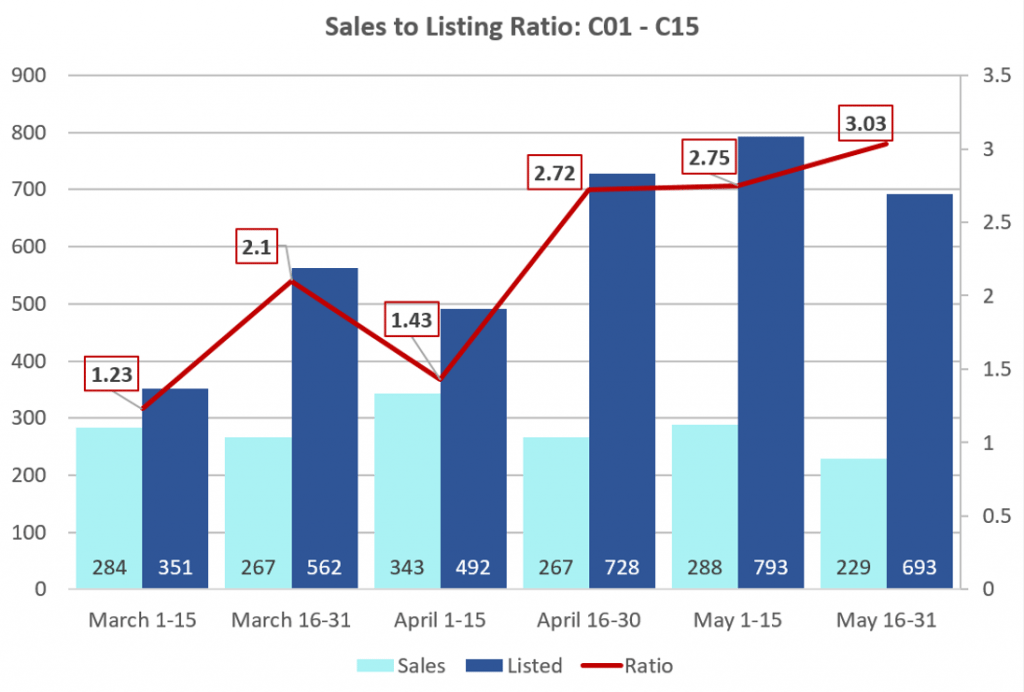The market has shifted so should I buy first or sell first. More importantly, I bought and haven’t yet sold – now what?

You can see from this graph that supply of freehold properties has gone up substantially giving buyers more choice. We are currently at 3.03 sales to listing ratio which denotes a balanced market – which is a good thing. But, in the meantime, if you bought a house a few weeks ago thinking that the market was still a frenzied seller’s market only to realize that it’s not – what do you do now? Or if you want to move, do you buy before selling or sell before buying?
If you bought recently and your house is on the market:
You probably noticed that the activity level on your house is lower than you expected; hopefully your agent prepared you for this. You will also notice that the public open houses are quieter and you are wondering where all the buyers have gone; buyers are being cautious and some properties are taking longer to sell. This is not happening just with your house. The freehold resale market is very spotty and inconsistent right now.
But, if you are lucky enough to get an offer on your house on the first day, or first few days that it’s on the market, consider it seriously because this may be the only one you will receive. Considering that you have bought, it would not be prudent to shrug off any offer. Offers are no longer a dime a dozen.
Work with an offer. Don’t be pig headed. What your neighbour sold their house for last week or last month is history.
If your house is not selling and you have a closing coming up on the house you bought, request an extension from the owners, if possible, to give you more time to sell. And speak with your mortgage broker immediately and put a financial plan in place.
If you bought recently but haven’t yet listed:
- If you bought a house and you need to sell the one you live in to close – list it immediately. We are nearing a slower time of year with the summer months just around the corner and time, in this case, will not be your friend.
- Choose an agent with a strong marketing plan and a strong network. Buyers are not plentiful so you need a powerful plan to reach as many buyers as possible.
- Choose an agent with lots of experience that has honed his/her intuition. Because we list every week, we knew the market was shifting at the very end of March. We had many clients who bought before selling and not a single one got caught selling in this shifting market. We got top dollar for all their houses because we hurried them to list sensing a shift at the end of March.
- Choose an agent who lists every week in your neighbourhood; not one that lists once a month or every few months. The market is constantly changing and, if an agent does not list often in this fast changing market, he/she will not know what’s going on and will not be in a position to advice you in a timely way. The top graph shows how quickly the market can shift; week by week.
- What list price should you assign? Should you list below market and set an offer date five days later, or look at offers anytime? Before you decide, consider the list price of your competition and take your cue from that. You should be the best priced property out there if you need to sell quickly. Remember that setting an offer date can have its drawbacks in a high inventory market. By the time you consider offers five days down the road, a more aggressively priced property could hit the market derailing buyers that were considering submitting an offer on your house. Also, by the time you consider offers, buyers could easily change their mind and, on offer night, you could be left holding the bag.
To assess if you should sell first, consider the following:
- Do you absolutely need a certain amount of money in order to buy your next house? In this case, if your finances are tight, you are better off selling first and knowing exactly how much money you have to buy another house. Remember that there are lots of houses to choose from, unlike the low supply market we came out of where homeowners would buy first because there was a huge shortage of houses to buy. It would be prudent, though, before you put your house on the market to look at what is available for sale for a few weeks before you list so that you can be confident that there are houses on the market that fit your budget and your needs.
- Are you ok if you have to find temporary accommodations for awhile until the right house comes along? In order to lower the odds of this happening, it’s advisable to get as long a closing as possible in order to potentially avoid having to rent.
We are strong believers that consumers should buy and sell in the same market, though, instead of taking a break. This means selling and buying within a few weeks or sooner. We have experienced way too many swings in the market and sometimes one can sell first in a down market and all of a sudden it changes once again to a seller’s market while you are trying to buy. Furthermore, many people who cashed out and rented in the last 15 years thinking that the market had peaked have found themselves completely wiped out of ever owning a home in Toronto again. You don’t want to be in this position.
To assess if you should buy first, consider the following:
- Are you looking for a house that is unique whereby it rarely comes up for sale? Have you been looking for the right house for years? In this case you may want to buy first because it could be a few more years before another one comes up for sale that suits you.
- Consider making your offer conditional upon selling your house. This will only be acceptable to the sellers if their house has been on the market for a long time and they are motivated to sell.
- Otherwise, if you want to buy first, decide what is the lowest price you are prepared to take for the house you are going to sell and make sure this figure is attainable.
These are uncertain times and most listing agents are confused and ruminate about the strategy to apply when bringing a property to market. Do you advise to list lower than market value and set an offer date? What if multiple offers don’t materialize? Will the seller leave money on the table? Do you list at market value and take as high an offer as you can?
There is so much to consider in this new market and one of the most important decisions you can make, as a seller and a buyer, is the agent you work with. Your representative must have the following skills or you will be at a huge disadvantage from the get go:
- It is prudent to work with an experienced agent who has worked many shifting markets.
- It is advisable to work with an agent who has a large network. An agent who sells out of the area you live in will not have the connections or the potential buyers to tap into.
- Choose an agent with a strong marketing plan and a strong network. Buyers are not plentiful so you need a powerful plan to reach as many buyers as possible.
- Choose an agent who is a great negotiator who can negotiate on your behalf. In a frenzied seller’s market, negotiating skills were not as critical.
- Make sure your agent is at the pulse of the market and is a good communicator. He/she should keep you abreast of market changes and activity so you have the most up to date and timely facts in order to make the most informed decision. We’ve just seen that the market can change in the blink of an eye and you don’t want to be left holding the bag.
